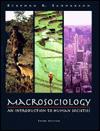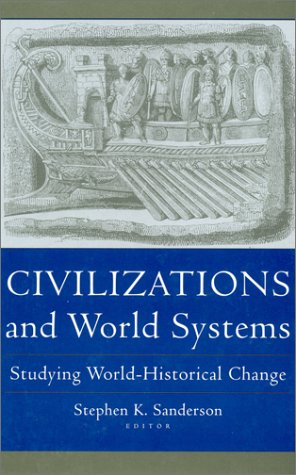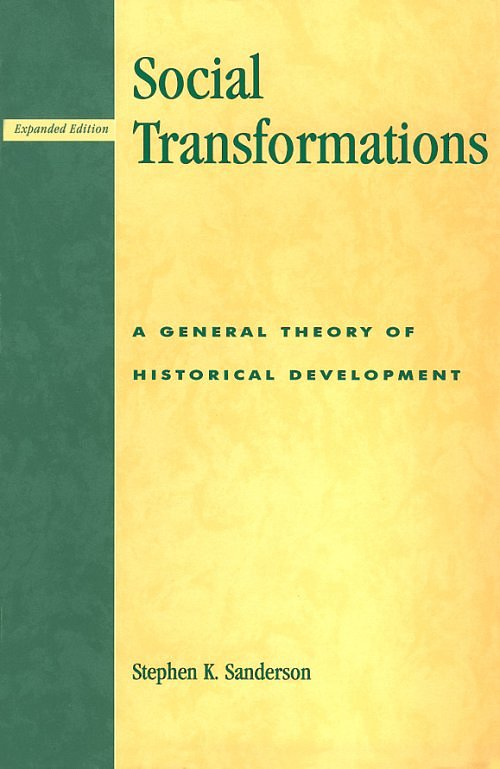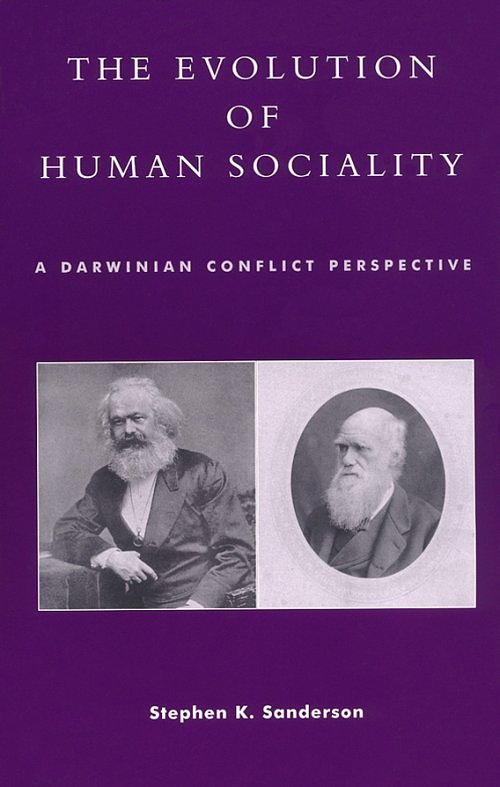|
Stephen K. Sanderson
Macrosociology: An Introduction to Human Societies

From Book News, Inc.:
A general sociology text written from a comparative, historical, and
evolutionary perspective. The most important changes in this updated edition
are a reworked discussion of the rise of modern capitalism and revised
and extended discussions of the recent economic and political changes in
the former Soviet Union and Eastern Europe. Annotation copyright Book News,
Inc. Portland, Or.
Table of Contents
1 Sociology and the Scientific Study of Human Societies.
2 Biological Evolution and the Emergence of Human Society and
Culture.
3 Sociocultural Systems and the Nature of Sociolocultural Evolution.
4 Preindustrial Societies.
5 Precapitalist Economic Systems.
6 The Origin and Evolution of Social Stratification.
7 The Origins of Modern Capitalism.
8 Capitalism and Socialism Since the Industrial Revolution.
9 Capitalism and Economic Underdevelopment.
10 Social Stratification in Industrial Societies.
11 Political Evolution and the Origin of the State.
12 Capitalism, Socialism, and the Evolution of the State.
13 Comparative Patterns of Racial and Ethnic Stratification.
14 The Gender Division of Labor and Gender Inequality.
15 Marriage, Family, and Kinship in Comparative and Evolutionary
Perspective.
16 The Rise and Expansion of Mass Education.
17 The Forms and Functions of Religious Belief and Action.
18 Retospect and Prospect: The Past 10,000 Years and the Next
100.
Civilizations and World Systems

From the Publisher:
Book Description
The grand historical and social theorizing of early in this century-works
that conjure up names like Marx, Spengler, Toynbee, and Sorokin-has been
out of favor for many years. Only recently have two new schools of research,
comparative civilizational studies and world systems analysis, emerged
to examine societies in the broadest possible terms. These two intellectual
movements have run on parallel tracks, seldom engaging in each other's
work-until now! Sanderson invites the leading figures in these two groups-including
Wallerstein, MacNeill, Frank, Wilkinson, Chase-Dunn, and Robertson-to compare
and contrast their assumptions and conclusions about broad-scale social
and historical change. A mixture of newly commissioned work and recently
published articles, this book is unmatched as a useful introduction to
current thinking about global historical change.
Social Transformations

From the Publisher:
In "Social Transformations: A General Theory of Historical Development"
Stephen K. Sanderson develops a general theory of social evolution and
uses it to explain the most important evolutionary transformations in human
history and prehistory. In this expanded edition Sanderson has added a
discussion of the biological constraints acting on humans that have helped
to push social evolution along strikingly similar lines throughout the
world. The new discussion places the theoretical arguments of "Social Transformations"
in the context of an even more comprehensive theory of human social behavior.
Table of Contents:
Preface
Preface to the Expanded Edition
1 Evolutionary Materialism: A General Theory of Historical Development
The Theoretical Strategy of Evolutionary
Materialism
Evolutionary Materialism and World History
2 The Neolithic Revolution
Hunter--Gatherer Societies Before 10,000 BP
The Worldwide Transition to Agriculture
Explaining the Worldwide Transition to Agriculture
Conclusions
3 The Origin of Civilization and the State
A Typology of Sociopolitical Evolution
The Origin of Civilization and the State as a Process of Parallel Evolution
Explaining the Origin of Civilization and the State
The Pace of State Evolution
Coda:Reconstructing Social Evolution Using
the Comparative Method
4 Agrarian States and their Evolutionary
Dynamics
Social Change in Agrarian States
Agrarian States as Precapitalist World-Systems
Social Devolution and the Collapse of Agrarian States
Conclusion: The Evolutionary Dynamics of Agrarian States
5 The Capitalist Revolution and the Beginnings
of the Modern World
Feudalism in World History
The Nature of Capitalism
The Origins of European Capitalism
The Japanese Transition from Feudalism to
Capitalism
Theories of the Transition to Capitalism
A New Interpretation
6 The Evolution of the Modern World, I: The
Expanding and Evolving Modern World-System
The Structure and Dynamics of the Modern World-System
The Evolution of the Capitalist
World-Economy,
Hegemony in the World-Economy
Development and Underdevelopment in the World-System
Some Test Cases
The Interstate System: The Political Side
of the Modern World-System
7 The Evolution of the Modern World, II: The
Emergence of the Institutions of Modernity
Industrialization in the West and Japan
The Rise and Demise of State Socialism
Stratification and Mobility in the Age of
Modernity
The Evolution of the Modern State
The Emergence and Expansion of Mass Education
The Scientific Revolution and the
Development of Modern Science
The Emergence of a Postindustrial Society?
8 The Question of Progress
Before the Rise of Modern Capitalism
After the Rise of Modern Capitalism
Conclusions
9 The Evolving Future
A Futuristic Scenario: W. Warren Wagar
The Challenges: Population Growth and
Ecological Degradation
The Challenges: Nuclear War
The Challenges: A World State
The Challenges: Capitalism, Socialism, or Barbarism?
The Crisis and Collapse of
Capitalist-Sensate Culture
10 Theoretical Reprise
Afterword to the Expanded Edition: Biological Constraints on Social
Evolution
References
Index
The Evolution of Human Sociality

From the Publisher:
This book attempts a broad theoretical synthesis within the field of
sociology and its closely allied sister discipline of anthropology. It
draws together what the author considers the best of these disciplines'
theoretical approaches into a synthesized theory called Darwinian conflict
theory. This theory, in the most general sense, is a synthesis of the tradition
of economic and ecological materialism and conflict theory stemming from
Marx, Marvin Harris, and the tradition of biological materialism deriving
from Darwin. The first half of the book is taken up with critiques of existing
theoretical approaches; this then leads to the full elaboration, in formal
propositional form, of synthetic theory. The second half of the book lays
out the large amount of evidence, both qualitative and quantitative, that
supports the synthesized theory.
Table of Contents:
Preface
Introduction
Part I: Sociological Explanations That Do Not Work
1 Functionalist Explanations
2 Social Constructionist Explanations
3 Stucturalist, Poststructuralist, and Postmodenist Explanations
Part II: Sociological Explanations That Work Better
4 Marxian Confict Explanations
5 Weberian Conflict Explanations
Part III: Sociological Explanatios That Work Best
6 Exchange and Rational Choice Explanations
7 Cultural Materialist Explanations
8 Sociobiological Explanation
Part IV: Toward Theoretical Synthesis
9 Darwinian Conflict Theory: A Unified Evolutionary Theroy of
Human Society
Part V: Darwinian Conflict Theory: The Weight of the Evidence
10 Reproductive Behavior
11 Human Sexuality
12 Sex and Gender
13 Marriage, Family, and Kinship
14 Economic Behavior and Economic Systems
15 Social Hierarchies
16 Politics and War
Epilogue
References
Index
©Frank Elwell
Send comments to [email protected]
.
|